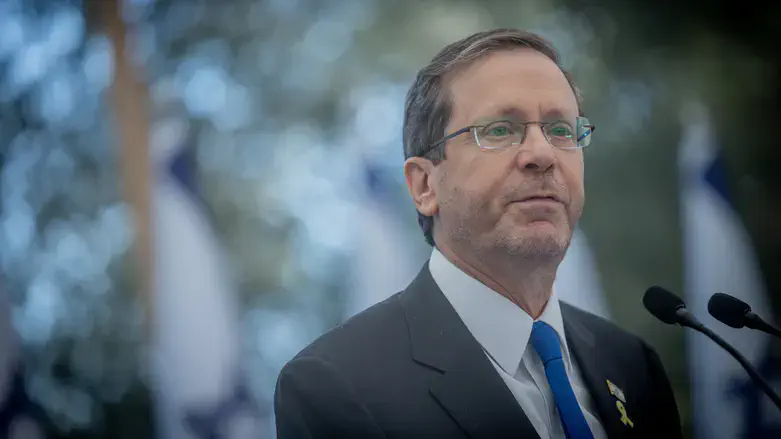
President Yitzhak Herzog toured the Eshkol Regional Council and Sha’ar HaNegev in the south on Thursday.
The President first went to Kfar Aza, where he visited the ruined houses and the kibbutz armory, which were destroyed in the murderous attack by Hamas on October 7. Herzog was welcomed by acting head of the Sha’ar HaNegev Council, Yossi Keren. Throughout his visit to the kibbutz Herzog was accompanied by the Rosenfeld family, who are residents of Kfar Aza, and the family of the late Hadar Berdichevsky. Hadar and Itay Berdichevsky were murdered on October 7th, while trying to protect their ten-month-old twins who survived.
The President visited Shlomit, a village that lost four of its residents, members of the settlement's first response team, who were murdered while defending the nearby village of Pri Gan. Before being killed, they saved the residents of Pri Gan from being massacred. The president was welcomed by the head of the Eshkol Council, Gadi Yarkoni, and he planted a tree there. Then he spoke with the community leaders, widows of the fallen, and several members of the first response team.
Dana Cohen, the widow of the late Aviad Cohen, asked the president to endorse the call for unity and said that he has the power to bring about a change in the discourse in Israeli society: "I feel that we need to greatly enhance the virtues of our path. We are fighting a war that is between light and darkness, between darkness that murders, rapes, butchers and rips organs from people’s bodies, and a nation who has the role of enlightening not only us, but the entire world."
President Herzog then visited kibbutz Holit, where 15 of its residents were murdered on October 7th. Four members of the Alziadna family and two foreign workers who were staying in the kibbutz were kidnapped – two of the family members and the foreign workers were released in the first hostage release deal. The president toured the kibbutz, and met with Naama and Gideon, residents of the kibbutz, who told him about their experiences on October 7th. The President then spoke with the residents and members of the board and asked to hear about the difficulties that they are currently experiencing. The President offered them his support.
President Herzog then visited Sde Nitzan, a community where five of its residents or their relatives were murdered. The President was welcomed by the children of the moshav, and spoke to the residents, including the daughter-in-law of Gadi Mozes, and mother of the late Tamir Adar, who are being held hostage in Gaza. The President met with the older members of the moshav, as well as the younger generation, who told him about their brave decision to set up a boarding school for the twelfth graders in the Eshkol Regional Council, which had originally been evacuated to different locations in the country, in order to keep the group together..
President Herzog concluded his visit in Ashalim, which took in the Kerem Shalom community. The terrorists also infiltrated the Kerem Shalom community on October 7th and two of its members were murdered defending their homes.
At the end of his visit Herzog said: "I'm finishing a long day in the Gaza Envelope. We visited a huge variety of communities in the region, communities that were hit very hard. We met bereaved and grieving families, families of hostages that we cannot forget even for one moment, that everything should be done so that they will return to their homes immediately."
"We have also seen communities that are beginning the process of construction and reconstruction. This is a major national challenge. We are working with the Tekuma administration, with the wonderful heads of regional councils, and with others. But we need to put this issue as a top priority on the national agenda at all times! Give support, raise spirits, see the people and look them in the eye. Believe that they will build, plant and restore, build homes and make the wilderness bloom again," he said.
"I want to wish the residents immense success – Jewish communities have always determined the borders of the country. We must do everything to preserve these communities and give them the tools to help them grow and flourish. This will be the best and most significant victory over our enemies."

